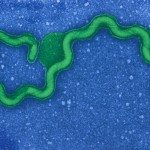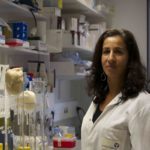Link to Pubmed [PMID] – 25724960
Link to HAL – pasteur-02536538
Link to DOI – 10.1128/AEM.00173-15
Appl Environ Microbiol 2015 May; 81(9): 3176-81
Leptospirosis, an emerging zoonotic disease, remains poorly understood because of a lack of genetic manipulation tools available for pathogenic leptospires. Current genetic manipulation techniques include insertion of DNA by random transposon mutagenesis and homologous recombination via suicide vectors. This study describes the construction of a shuttle vector, pMaORI, that replicates within saprophytic, intermediate, and pathogenic leptospires. The shuttle vector was constructed by the insertion of a 2.9-kb DNA segment including the parA, parB, and rep genes into pMAT, a plasmid that cannot replicate in Leptospira spp. and contains a backbone consisting of an aadA cassette, ori R6K, and oriT RK2/RP4. The inserted DNA segment was isolated from a 52-kb region within Leptospira mayottensis strain 200901116 that is not found in the closely related strain L. mayottensis 200901122. Because of the size of this region and the presence of bacteriophage-like proteins, it is possible that this region is a result of a phage-related genomic island. The stability of the pMaORI plasmid within pathogenic strains was tested by passaging cultures 10 times without selection and confirming the presence of pMaORI. Concordantly, we report the use of trans complementation in the pathogen Leptospira interrogans. Transformation of a pMaORI vector carrying a functional copy of the perR gene in a null mutant background restores the expression of PerR and susceptibility to hydrogen peroxide comparable to that of wild-type cells. In conclusion, we demonstrate the replication of a stable plasmid vector in a large panel of Leptospira strains, including pathogens. The shuttle vector described will expand our ability to perform genetic manipulation of Leptospira spp.



